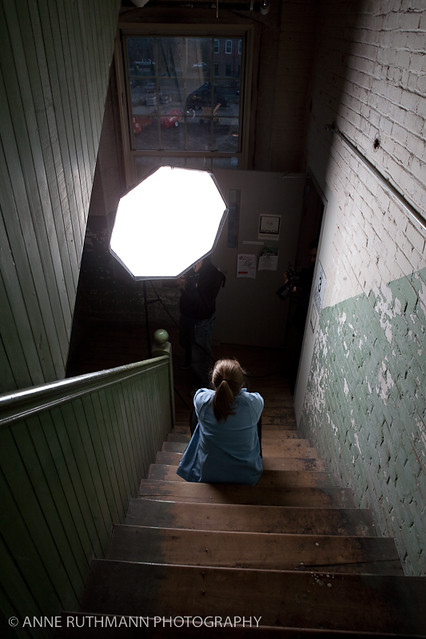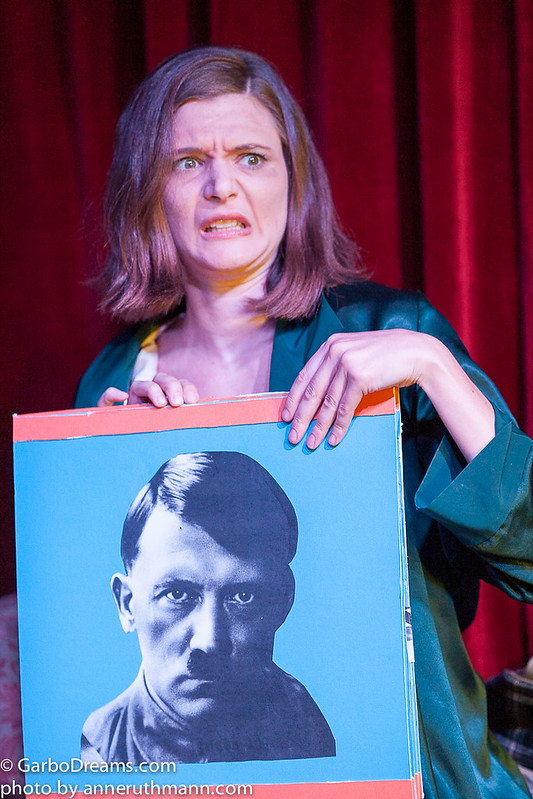Before I was a photographer, I just couldn't wrap my head around why I looked SO different in other people's photos than I thought I looked like in real life. I felt like no matter who took photos of me, it was never the same person in the photo than who I was used to seeing in the mirror or in selfies! If you feel this way, you're absolutely right, but it's because you actually never get to see yourself as the world sees you until you look at a photograph.
Scene & a most unflattering portrait from Garbo Dreams by Lauren LoGiudice
You aren't crazy, or abnormal to think you don't look like yourself in photos, but there are three important factors that can make your portrait look more or less familiar to you:
1. The Mirror Effect
Any time you look in a mirror, you're actually seeing your identical "evil" twin who fools you into thinking this is what you look like to everyone else. This person is who you have come to think is your image, but it's actually a reversed image of what everyone else sees. That mole is not actually on the right side of your face as it appears in the mirror, it's on the left side. Your larger eye is not actually the left eye you see in the mirror, it's the right eye (and yes, almost everyone has a larger or smaller eye). Since many forward-facing "selfie" cameras mimic this mirrored effect, you're always seeing your mirrored twin, rather than the person that everyone else sees when they look at you. A photograph reflects back your actual self, as others really see you, with a few other variables to consider, as mentioned below. You notice all of the differences because they are new to your eye versus the image your brain has imprinted as what you look like.
via GIPHY
2. The Lens Effect
The human eye is equivalent to a roughly 45mm lens on a full-frame DSLR. This means that your portrait will often appear different if the lens used to photograph you is wider than 40mm or tighter than 50mm on a full frame DSLR. Many portrait and headshot photographers use lenses in the 70-200mm range that end up compressing the relationship between the tip of your nose and the back of your head, which can often reduce any facial features that may feel exaggerated when looking at yourself in the mirror with your 45mm lens eyeballs. However, if a photographer uses something as wide as a 24mm lens for a portrait, it will often exaggerate any features and distances between them on the canvas of a face. If possible, ask your photographer to use a few different lens focal lengths to help you decide which version of your face looks best to you in print. A photographer also has the ability to see your face at a higher or lower perspective than you usually do, so when that is combined with a lens choice, it can affect which features are more or less prominent in the 2-Dimensional photo.

3. The Lighting Effect
Most of us view ourselves in overhead lighting, whether it's in the bathroom with the lights centered above our face, in a general indoor setting where there are skylights or overhead lights, or outside where we have sunlight almost always at an angle higher than our physical maximum height in relation to the horizon of the earth. All of this means that when we see an unusual lighting pattern on our face other than what is natural and familiar to us, it highlights features of our face that we aren't used to seeing highlighted, or creates shadows that don't seem flattering because we haven't adjusted to their appearance over the many years we've come to accept the naturally occurring shadows on our face. This is why a dramatic or creative portrait may be more flattering to the overall concept of the image, rather than what an individual might find flattering for their own personal use or interpretation. A skilled photographer can use light to enhance or minimize certain features of your face, but you most definitely pay more for someone with that level of technical expertise and experience, versus someone who hasn't yet figured out how to manipulate light to your best benefit.
I hope this helps you understand why it is that you appear to look different in photos every single time you see them. It's not you.. it's your brain that has been trained to see you in a certain way almost your entire life... and it's been seeing you differently than everyone else sees you all along!








0 comments, to add [click here]:
Post a Comment